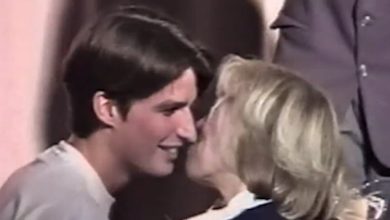New Hampshire town creates public art ordinance after free speech debate over donut mural

Local News
Conway residents passed the ordinance by a vote of 1,277 to 423 in Tuesday’s municipal election.
A customer holds the door for a family arriving at Leavitt’s Country Bakery, Thursday, April 13, 2023, in Conway, NH AP Photo/Robert F. Bukaty
CONCORD, N.H. (AP) — A New Hampshire town’s new ordinance billed as ‘a way forward’ for public artwork has not resolved a bakery owner’s First Amendment dispute over a large baking painting, and his lawyer predicts it will only lead to more litigation as city officials become “speech police.”
Conway residents passed the ordinance by a vote of 1,277 to 423 in Tuesday’s municipal election, part of a lengthy vote for the budget and spending and for the selection of government positions, such as the selectboard , the treasurer and the police commissioner.
The vote came more than a year after the owner of Leavitt’s Country Bakery sued the city over a painting painted by high school students displayed on his storefront, showing the sun shining on a mountain range made of donuts strawberry and chocolate covered with sprinkles, a blueberry. muffin, cinnamon roll and other pastries.
The zoning board decided that the painting was not so much art as advertising and therefore could not remain as is due to its size. At approximately 8.6 square meters, it is four times larger than the city’s sign code allows.
The new ordinance requires applicants to meet criteria for art on public and commercial property. It says that while zoning and planning boards must approve the appropriateness of theme, location and design before the selection committee reviews each proposal, the process must have “no intrusion into artistic expression or the content of the work.
“There is no part of the writing where we are trying to limit any type of speech,” Planning Board Chairman Benjamin Colbath said during a March 28 meeting. “We tried to write this carefully and certainly took inspiration from what many other communities are doing, as well as confirming with attorneys on this.”
A lawyer for the bakery had urged voters to reject the ordinance.
“In general, it is people who decide whether to speak or not; they don’t need to ask the government ‘please’ first,” Robert Frommer wrote last week in the Conway Daily Sun.
“All commercial property owners should obtain permission before installing any sort of public art in the city,” Frommer wrote, and city officials can “refuse murals because of what they depict or of the person who installed them.
Sean Young, the bakery’s owner, said he was voting NO: “Local officials can’t play art critic.” »
Young sued after city officials told him the painting could stay if it showed real mountains — instead of pastries suggesting mountains — or if the building was not a bakery.
Young’s lawsuit was put on hold last year as residents considered revising how the city defines signs, in a way that would have allowed the sign to remain in place. But this measure was considered too broad and complex and was not adopted.
The mural remains in place for now, while his case goes to trial next November.
Frommer told The Associated Press in an email that the city did not say whether the new ordinance would impact the Leavitt mural, “and if Sean wanted to paint a different mural with the high school students from one of his businesses, he should take the plunge.” through the ordinance’s unconstitutional obstacles.
The city attorney did not immediately respond to an emailed request for comment Wednesday.
When Colbath discussed the ordinance at last month’s meeting, he described it as a way to facilitate more public art in town.
“There was a gap in our ordinance and I wanted to try to clarify it and make a path forward for community art easier,” he said.
Additional news alerts
Get the latest updates as they happen.
Boston





